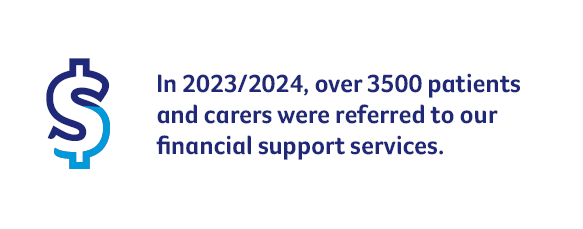
When faced with a cancer diagnosis, the last thing anyone wants to worry about is the financial impact.
For many people this impact can be significant, causing additional stress and worry and even impacting treatment decisions. On top of this, rising costs of living over the last few years have worsened the financial impact for cancer patients and their families, meaning often finances are the first thing someone thinks about when receiving a diagnosis, when it really should be the last.
It's important to understand the potential costs of a diagnosis and treatment, where these come from and what support is available.
1. There can be significant out-of-pocket costs associated with a cancer diagnosis.
Many patients face significant out-of-pocket costs associated with their diagnosis and treatment.
According to a study from the Daffodil Centre*, people diagnosed with cancer are paying significantly more in out-of-pocket costs than people without cancer. That's accounting for age and other health and sociodemographic factors.
In the past two years, more than half of the people diagnosed with cancer paid more than $1000, with almost 1 in 10 paying costs higher than $10,000.
2. There are direct and indirect costs
The cost of cancer can vary based on the type and stage of cancer, the type of treatment, and whether someone is treated at a public or private hospital. Some of these costs may not be covered by Medicare or a private health fund, which can result in unexpected medical costs.
Common out-of-pocket medical costs include:
- GP and specialist gap payments: the difference between what a doctor charges and what Medicare or private health funds cover.
- Scans and tests: costs of scans and tests outside of the public system.
- Surgery fees: day surgery, hospital accommodation or operating theatre fees.
- Prescriptions: over-the-counter and prescription medicines and dressings.
- Medical devices: necessary appliances and devices such as breast prostheses or compression garments.
- Visits to allied health professionals: visits to physiotherapists, dietitians, and complementary therapists like acupuncturists and aromatherapists.
On top of these, there are also a range of unexpected indirect costs that are often just as challenging as direct medical costs.
These are the expenses that are not from the treatment itself but from the changes and adjustments to everyday life because of a cancer diagnosis, including:
- Home modifications: changes to your home to manage symptoms or accommodate new needs.
- Travel expenses: including petrol, parking, and taxis for trips to and from treatment.
- Accommodation: significant costs if you need to stay close to treatment.
- Childcare: the need for childcare can increase as parents need to attend more medical appointments or require time to recover after treatments.
Ask about out-of-pocket costs
These costs can add up, and if a patient or carer needs to stop working it can become even harder to stay on top of these.
Understanding these costs can make them easier to manage, so it's important to ask about the cost of treatment and what costs will be covered by Medicare or private health funds. This can help patients and families to make informed decisions about their treatment and limit unexpected costs.
3. There is help available.
1 in 5 patients report needing financial advice following a diagnosis. Despite this, many patients are unaware of the support or information available or face barriers in accessing professional support.
Having access to the right information and support can help patients and their families understand their financial options and feel confident to navigate these concerns at one of the most difficult times in their lives.
a. Cancer Council's Information Resources
Cancer Council offers a range of information resources to help patients and their families understand the financial challenges that a cancer diagnosis and treatment can result in, and how to navigate these.
- Cancer and your finances booklet
- Superannuation and cancer
- Insurance and cancer
- 'Understanding cancer and your finances' video series, including:

b. Cancer Council's Financial Support Services
Cancer Council offers a range of financial support services for patient and carers who are experiencing financial hardship as a result of a cancer diagnosis.
This includes support with budgeting and managing everyday expenses, advocacy to help manage mortgages or other debts, advice around accessing superannuation, insurance payments or Centrelink payments and for those in acute financial hardship, temporary financial support through food and fuel vouchers or bill payments.
We've recently introduced a new Financial Navigation Service to provide patients and carers with tailored information, resources and support over the phone to navigate financial issues.






